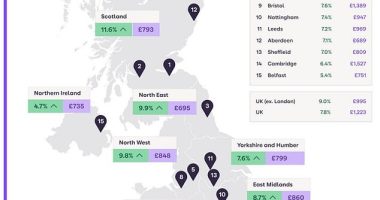THE next energy price cap comes into effect this October, and households are already being warned of huge price rises.
A staggering £600 could be piled on top of the current price cap – here’s what you need to do now.
Ofgem, reviews the cap twice a year in February and August, with the new limits taking effect every April 1 and October 1.
This means we have six months until the new cap comes into effect, and roughly four months before Ofgem announces the new figures.
But energy experts at Cornwall Insight predict an increase of over £600 to the current energy cap, meaning it could double in a single year.
If these estimations are realised in October, thousands of households already facing the cost of living crisis will be set to struggle further.


The price cap increased in April from £1,277 to £1,971, adding nearly £700 to the average dual fuel default bill, but the exact amount more you pay depends on usage.
Dr. Craig Lowrey, principal consultant at the company said: “If Cornwall Insight’s predictions for the winter cap to rise to £2,599 per year are realised, households will be set for yet another significant hit to their finances in October.
“While the government’s £350 worth of support will provide some respite to consumers this time around – all-be-it not far enough – with the cap almost guaranteed to rise again, the government will need to look at expanding the scale and scope of this support after October at the very least.”
Why are energy prices going up?
Most read in Money
The invasion of Ukraine and sanctions on Russia are causing rocketing wholesale prices of gas.
Russia is one of the world’s largest oil and gas producers, supplying Europe roughly 40% in total.
Although Britain only imports around 5% of it’s gas from Russia, it relies on pipelines running through Belarus, Poland, Ukraine and into Germany – hence why bills are climbing at alarming rates.
Are fixed bills cheaper?
The energy price cap only applies if you are on a default energy tariff, and won’t apply if you’re on a fixed term tariff.
Fixed deals used to be cheaper than the price cap, but this is no longer the case.
Martin Lewis explained that most fixed tariffs are at least 40% more expensive than the April price cap.
So households should only switch to a fixed deal if it’s no more than 15% of the April price cap, according to the expert.
How to lower your energy bills
Utilita told The Sun that you can save up to £332 on your annual energy spend with the following five tips.
Turn the heating down by one degree to save roughly £158 on your heating bill.
Meanwhile, turning down the hot water tap temperature could spare you an extra £79, according to its research.
Avoid putting appliances on standby and unplug gadgets to pocket a £54 saving.
Switch the lights off in unoccupied rooms to save £25 a year.
And if you wash your clothes at a lower temperature of 30 degrees, you’ll nab £16 in savings.
Other help with energy bills
You may qualify for schemes run by local councils, charities and the government if you can’t pay your bills.
The following organisations offer free advice if you need someone to speak to:
It’s also worth speaking to your energy supplier directly because they have their own schemes in place to help customers with bills and arrears, including hardship funds and grants.
Keep an eye out for these offers as they won’t appear on the open market.
For example, British Gas customers could grab £750 towards bills this summer as the energy supplier adds £2million to its hardship fund.
The Household Support Scheme has been extended with another £500million for cash-strapped households until October.
Chancellor Rishi Sunak also announced a £150 council tax discount to ease the cost of living crisis.
The following forms of support are currently closed for the year until next winter, but it’s handy to make a note of them to be prepared.
- Those getting state pension can get between £100 and £300 to offset the cost of keeping their homes warm with the winter fuel allowance.
- Other low income households can get £25 a week to help with energy bills during the winter thanks to the cold weather payment scheme too.
- Struggling households on a low income can grab £140 towards heating costs as part of the warm home discount scheme.


If you’re looking to reduce costs, here’s a full list of gadgets that could save you money on bills.
This Brit saved £220 a year on her energy bill with simple tricks including tackling draughts.
We pay for your stories!
Do you have a story for The Sun Online Money team?










